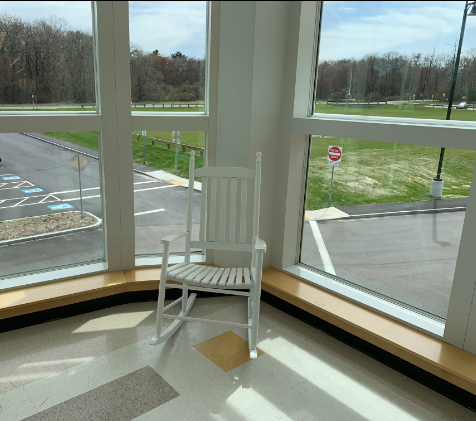Can a Person Be Worked to Death?
How Much Work Is Too Much?

The Abington PTO donated rocking chairs to the High School at the start of the 2018-2019 school year. Students can be found reading or relaxing on the rockers at different times of the day.
Can too much work harm you? In Japan, working yourself to death is so common that it has a word: karōshi. Marianne Stenger, a writer with Open Colleges, shows that too much work, such as homework, classwork, jobs, and so forth, can harm you physically, mentally, and effect your behavior.
Too much work is a problem, mainly because of the side effects. According to Zawn Villines in an article she wrote on GoodTherapy called “Fighting a Losing Battle: Too Much Homework can Interfere with Learning,” students with too much homework can experience some of the following effects: exhaustion, headaches, migraines, stomach problems, neck problems, back problems, eyestrain, stress, anxiety, and in serious cases depression.
Should high school students be concerned, though? The more serious cases of being worked to death occur in adults who work longer hours. But, students can still be affected by overworking.
The average high school student in the U.S. gets around two hours of homework per night, according to Stenger in her article entitled “Don’t Overload Students: Assigning Too Much Work Discourages Learning.” What about students at Abington High?
Freshman Gregorio Baez said, “Sometimes, I get a lot of work, and it can get frustrating when I have essays, projects, and a lot of homework.” Besides frustration, overworking could be bad for students because it can cause stress which can lead to severe health risks. Dominic Vanesse, also a freshman at AHS, said, “Work is sometimes a problem, especially when I have work due in all of my classes at the same time. It can get stressful sometimes.” Although a lot of work can cause health risks, there are benefits in a moderate amount of work.
According to Abigail Hess in an article she wrote for CNBC entitled “Students Who Work Actually Get Better Grades, but There’s a Catch,” a moderate amount of work can make it easier to understand subjects, easier to fully learn harder subjects, and increase your ability to learn. A moderate amount is hard to measure, though. A balanced amount of work for one person may be a lot for another.
Mr. McGinness, a science teacher at Abington High School, said, “The time needed to understand content can vary from student to student, so I do believe some students need to spend more time than other peers to achieve mastery of the content.” Providing balance for the students can be tough for the teacher to manage, so if you think you are getting too much work, talk to your teachers, guidance, or parents.
Abington High is trying to help students manage stress as best as they can. English teacher Ms. Pflaumer set up multiple Donors Choose projects to supply books, comfy beanbags, and pillows in her classroom so that students can relax while they read. In the hallway, there are also rocking chairs that were donated to the school by the Abington PTO. A third thing is that the school has implemented a new room, “The Nook”, for students that need a break to relax. It is located in the guidance counselors wing. The room has beanbags, chairs, carpet, and most importantly, it’s quiet. There are also weeks with no homework, such as the one from December. The school is continuing research on this, and they are adding and taking away certain things as needed to make the students’ school lives become easier.
Mental health is just as important as physical health. More people need to understand the importance of keeping their mental health in good shape. To help juggle work, try to schedule it out. Use the agendas given at the start of the year, or use your phone or any other electronic device to plan out your work ahead of time. Avoiding procrastination will also help you get your work done, along with keeping your electronic devices away from you while you work.

